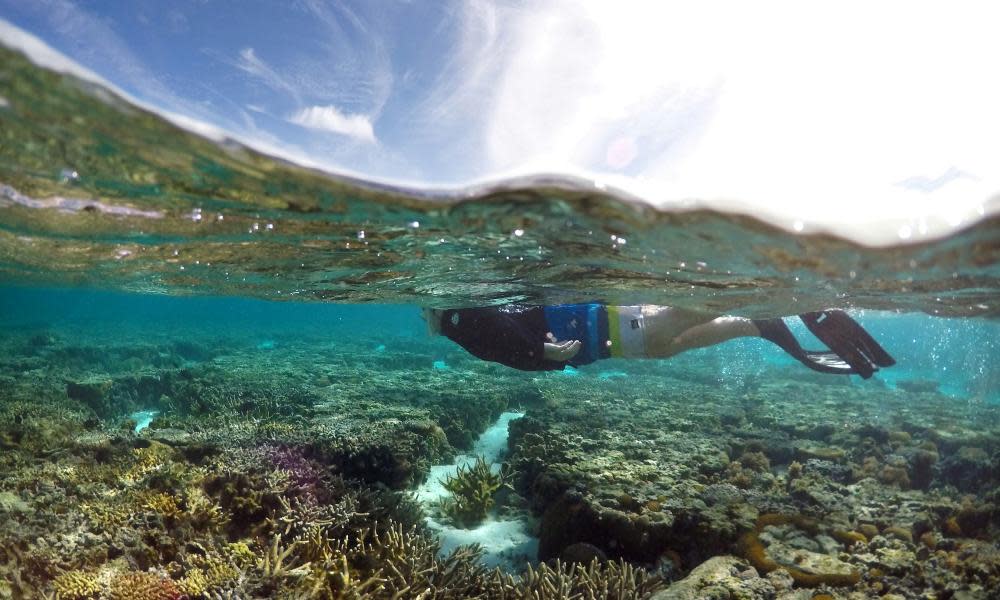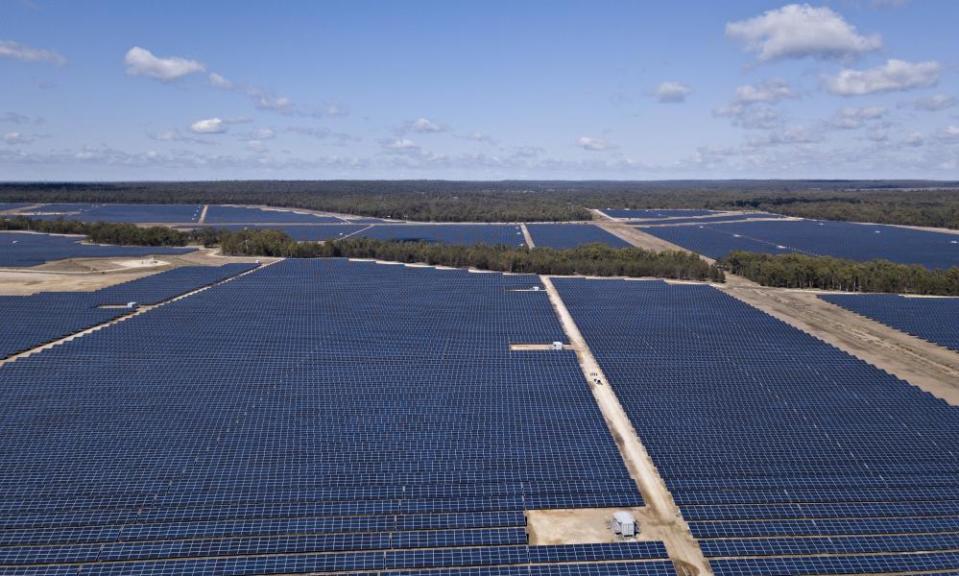'We have to change Queensland': the environmental issues at stake in the election

When David Springett executed a perfect underwater marriage proposal to his girlfriend three years ago, her response in the affirmative gave him another reason to love the Great Barrier Reef.
Springett, 45, from Cairns, sells diving gear to shops and training centres the length of the Queensland coast. He talks to lots of tourists and tourism operators, and dives “for fun” every few weeks.
But he is starting to fear that, like the reef, his livelihood could be on borrowed time. “I can’t imagine there’ll be any diving industry if the reef dies off,” he says.
The Springett family – which now includes one-year-old Summer – have just moved inland from a beach suburb to Kuranda, 300 metres up in the tablelands, because of worries about rising sea levels caused by global heating.
The environmental tensions in this Queensland election appear to pitch producers in rural areas against government intervention.
Springett, a former diving instructor, is retraining as an electrician and is hoping to snag an apprenticeship with an eye on a job in a renewable energy boom in the state.
This is a transition that Queensland is now facing on a statewide scale as it heads to an election on 31 October. Can it break away from fossil fuel extraction and develop jobs and growth in a way that protects its remarkable landscapes and ocean wonders?
Selling a message of hope and prosperity that retains the state’s global brand of corals, beaches and rainforests is one that, according to Nick Heath, no political party has been able to achieve.
“We don’t have a political party that can nail that narrative,” he says.
Heath has seen Queensland elections from every available angle. He has led environmental groups campaigning on climate and the Great Barrier Reef, lobbied on behalf of the seafood industry and been an adviser to four Labor ministers after switching from management consultancy.
“We have the horns of a dilemma in Queensland,” he says. “We have some of the most important environments on the planet and that’s not coming from me – just take David Attenborough’s word for it.”
When Attenborough, the 93-year-old natural history documentary maker-turned environmental activist, is asked to name his favourite place on Earth, his answer will invariably be north Queensland.
Attenborough’s apparent love for Queensland above all other places is illustrative, Heath says.
To an outsider, Queensland’s reputation is firmly fixed by “the biggest reef, the cutest critters and the whitest sands”, but Heath says voters are apathetic and politics are stuck in an adversarial cul-de-sac.
No party, he says, has managed to sell a policy path forward that brings industry and sustainable growth together in a way that doesn’t use the environment as something to be burned through.
“If we want to change Australia, then we have to change Queensland,’” he says. “The challenge to the environment movement is how do we monetise a more sustainable economy and help the economy transition to a better place.”
On the face of it, the environmental tensions in this Queensland election appear to pitch producers in rural areas against government intervention.
Graziers and sugarcane growers are lining up against the Labor government’s new laws that will allow the state to control the amount of pollution running into reef catchments.
Some have latched on to the claims of the contrarian scientist Dr Peter Ridd, who says farm runoff is not harming corals and that the reef is not in need of saving. Rapid loss of corals, three mass bleaching events in five years, the federal government’s main science agencies and the marine park authority suggest otherwise.
The federal Coalition backed a Senate inquiry into the state’s water quality laws and found that the science underpinning them was sound.
The fight over water regulations has been amplified for a year or more in the pages of the state’s New Corp Australia newspapers.
In May the Liberal National party failed in parliament to disallow parts of the rules. It has hinted that if elected it would introduce legislation locking in unspecified levels of control.
Heath says the dominant Murdoch media helps to set the narratives of rural versus city and greenies versus producers – including the row about the water quality rules which, he points out, have not even been enforced yet.
“It’s not real,” he says of the conflict.

He blames what he calls “agripolitical groups” in farming and fishing that “to justify their existence” are loud, vocal and antagonistic and drown out more reasonable voices. “Whether there’s actually a problem or not, they have to agitate and create fear just to maintain their business model,” Heath says.
“We have such an apathetic electorate and we need to engage so much more because our understanding is so impaired by the mainstream media.
“If we were fully informed then so many more of us would be attuned to the issues at stake and then we’d be more concerned at the standards of debate and the quality of the futures being put in front of us.”
In Townsville, Dr Maxine Newlands is a political scientist at James Cook University who has studied how environmental issues fit into people’s daily conversations and are treated by media.
“There’s almost been a complacency from some quarters around the natural beauty that we have,” she says. “There are people here in Townsville who have never been on the reef, yet they live here. That speaks to the politics and the lack of engagement with these beautiful places.
“Some editors won’t put climate change on the front page. It’s all about pushing jobs and growth.”
This week the Queensland Conservation Council tried to energise the campaign with analysis showing that moving the state to 100% renewable energy was feasible, possible and could generate 10,000 construction jobs, then 11,000 ongoing jobs.
During an online environment forum organised by QCC, the state’s environment minister, Leeanne Enoch, the LNP spokesman, David Crisafulli, and the Greens MP, Michael Berkman, debated the reef regulations, climate policy and the need for more protected areas.
Crisafulli moved quickly to try to hose down fears an LNP government would lead to a weakening of the state’s land-clearing laws, the Vegetation Management Act.
The last LNP premier, Campbell Newman, weakened the act in 2013 and land-clearing rates skyrocketed, to the extent the state was labelled a global land-clearing hotspot.
The Palaszczuk government reintroduced restrictions in 2018 but Gemma Plesman, the Queensland campaigns manager for the Wilderness Society, says she is waiting for data to see if those changes have slowed clearing.
In 2018, she says, before the Labor government passed the laws, annual land-clearing was at 392,000 hectares – the equivalent of “bulldozing a Gabba-sized forest every three minutes”.
A WWF-Australia commissioned study estimated land clearing at those rates was killing about 1.1 million mammals, 3.7 million birds and 39.9 million reptiles a year.
Crisafulli has pledged that an LNP government would retain protections for land within 50 metres of a reef watercourse, with another category covering areas protected by covenants or used for offsets.
But Plesman says the LNP has so far been silent on a category of vegetation that supported millions of native animals and threatened species. “There are still loopholes in current laws that allow clearing,” she says.
About 32m hectares of land in Queensland is mostly open to land clearing under the current laws, she says, yet there is evidence those areas have regrown to habitat that could support threatened species.
Some editors won’t put climate change on the front page. It’s all about pushing jobs and growth.
Dr Maxine Newlands
Land clearing as a political issue tends to get ignored, especially in inner-city seats, but Plesman says people care.
The Wilderness Society has polled three marginal seats in south-east Queensland – Springwood, Mansfield and Chatsworth – and Plesman says 71% of voters said they were concerned about land clearing and its impact on koalas.
“We need politicians to know that just because people are understandably stressed through Covid, people also haven’t forgotten about this,” she says. “We’ve lost 80% of koala populations in south-east Queensland and 50% across the state.”
This month the Palaszczuk government released a 10-year protected area strategy and retained a pledge to have 17% of the state under protection, in line with UN convention targets. The state now has 8% of its land area under some form of protection.
Conservationists say the strategy, which included an extra $60m in funding, is a “good start” but it lacks timelines and the funding is well below what is needed.
Heath says Queensland’s fame internationally as a place rich in species and natural wonders – from reefs to ancient rainforests – should put environmental protections central to policy debates.
“There’s no greater risk to the global environment than here in Queensland,” he says. “We have enormous value and enormous stakes, but our debate is about other things entirely.”

 Yahoo News
Yahoo News 
